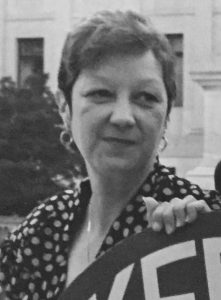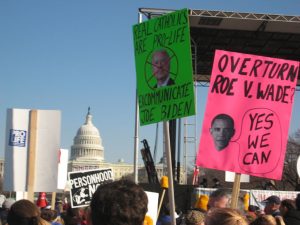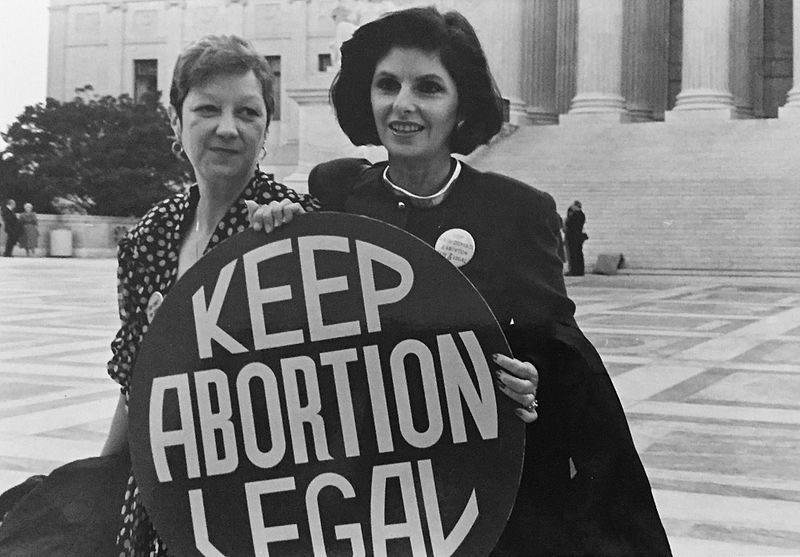McCorvey became an outspoken pro-life activist in 1995–but, near the end of her life, “Jane Roe” confessed she’d been paid off by anti-abortion groups.
For years, Norma McCorvey—the woman known for a while as Jane Roe, the plaintiff behind Roe v. Wade—lived something of a double life. Despite waging a successful, high-profile legal battle to legalize abortion, McCorvey switched sides in 1995, becoming a vocal and outspoken pro-life activist.
McCorvey’s sudden change of heart, however, was not all it appeared.
“AKA Jane Roe,” a documentary premiering today on FX, contains an interview with McCorvey in 2017, shot just months before her death. In it, McCorvey recants her pro-life advocacy, admitting she was never against abortion in any particular personal capacity—she had, instead, been bribed by anti-abortion groups like Operation Rescue to sing a different tune.

For pro-life crusaders, McCorvey’s backing lent their cause additional credence. She was a prize, a trophy conversion.
“I was the big fish,” McCorvey says in the documentary. “I think it was a mutual thing. I took their money and they’d put me out in front of the cameras and tell me what to say.”
“That’s what I’d say,” McCorvey said. “It was an all an act. I did it well too. I am a good actress.”
McCorvey made the admission during what she herself termed as a “deathbed confession.” While the documentary has yet to air, Yahoo! Life previewed the footage.

Boston. (CCA-BY-3.0).
The clip of McCorvey’s confession, says Yahoo!, shows a visibly sick woman.
But McCorvey did not mince words about whether she really believes pregnancy should be a woman’s choice.
“If a young woman wants to have an abortion,” McCorvey said, “that’s no skin off my ass. That’s why they call it choice.”
The documentary’s director, Nick Sweeney, said his goal in making “AKA Jane Roe” was not to stir controversy—at least, not necessarily. Instead, Sweeney says his priority was giving voice to McCorvey, a woman whose legal struggles profoundly changed America’s legal landscape.
But no matter her legal legacy, McCorvey spent much of her life feeling used, both by abortion activists and their most radical opponents.
“The focus of the film is Norma. That’s what I really want people to take away from the film—who is this enigmatic person at the very center of this very divisive issue,” Sweeney told Yahoo! Life. “With an issue like this[,] there can be a temptation for different players to reduce ‘Jane Roe’ to an emblem or a trophy, and behind that is a real person with a real story.
“Norma,” Sweeney added, “was incredibly complex.”
A focal point of Sweeney’s film is one of Roe v. Wade’s greatest ironies—that McCorvey, whose case lifted restrictions on abortion procedures nationwide, never actually had one.
At the time, Yahoo! says, McCorvey lived in Texas—and back then, in the 1970s, the state outlawed abortion except in instances where the mother’s life might be in danger. Attorneys, though, were even then eager to challenge the restriction. And McCorvey—poor, uneducated, and unable to pay for a ticket out of the state—was an ideal plaintiff.
Although McCorvey never did get an abortion, she said she did not want other young women to feel trapped, the same way she did when she found out she was pregnant.
“I know how I felt when I found out I was pregnant and I wasn’t going to let another woman feel that way—cheap, dirty and no good,” McCorvey said in the documentary. “Women make mistakes, and they make mistakes with men, and things happen. It’s just Mother Nature at work. You can’t stop it. You can’t explain it. It’s just something that happens.”
McCorvey, says Yahoo!, would never have even had the chance to follow up on the procedure—it took three years from the lawsuit’s initial filing for the case to find its way to the Supreme Court. By then, McCorvey had given birth and put the child up for adoption.

For a decade after the Court’s 1973 decision, McCorvey maintained an uneasy relationship with pro-choice activists—many of whom were not keen to work with her, because she several times changed the story of how, exactly, she became pregnant.
In 1995, McCorvey—then working at an abortion clinic—befriended an evangelical minister named Flip Benham, affiliated with the anti-abortion Operation Rescue. After meeting Benham, McCorvey began appearing with pro-life groups, giving interviews and writing memoirs, most all of which detailed how she, the plaintiff behind Roe v. Wade, came to oppose the rights she had so visibly fought for.
The religious right’s strategy, says NBC News, was to meld together disparate Christian factions into a united ideological front. When McCorvey declared her allegiance to the pro-abortion movement, she made something of a contradictory statement: she both was a born-again Christian, and a faithful Catholic, two identifiers which tend not to go together. And today, there remains a great coincidence between profound religiosity and opposition to abortion, at the grassroots level and the state level.
But, NBC suggests, McCorvey’s dispensation was indicative of a new social allegiance: that to be Christian also meant being against abortion.
Rob Schenck, an evangelical minister and the founder of Operation Rescue, admits McCorvey’s fraud and his role in propagating it. And in “AKA Jane Roe,” Schenck, too, says he regrets targeting someone like McCorvey, whose difficult socio-economic position made it easy for a group like his to take advantage.
“What we did with Norma was highly unethical,” Schenck said, admitting the documentary made him cry. “The jig is up.”
“I knew what we were doing,” Schenck said. “And there were times when I was sure she knew. And I wondered: ‘Is she playing us?’ Because I know damn well we’re playing her.”
Sources
A new documentary looks at how Roe v Wade affected Norma McCorvey
FX’s Jane Roe deathbed confession reveals the abortion lie at the heart of the religious right
Roe v Wade: Woman behind US abortion ruling was paid to recant
The woman behind ‘Roe vs. Wade’ didn’t change her mind on abortion. She was paid


Join the conversation!